Christie’s has announced An American Place: The Barney A. Ebsworth Collection, will be offered in a dedicated evening and day sale in November as a highlight of its flagship 20th Century Week in
New York. The collection of Barney A. Ebsworth represents an
extraordinary achievement in the history of collecting — a singular
assemblage of over 85 artworks that illuminates the rise of American art
across the 20th century. Highlights of the collection include Edward Hopper’s Chop Suey, 1929, the most important work by the artist still in private hands (estimate in the region of $70 million), Jackson Pollock’s Composition with Red Strokes (estimate in the region of $50 million) and Willem de Kooning’s Woman as Landscape (estimate in the region of $60 million).
A global tour of highlights will commence in Paris 6-9 September, coinciding with La Biennale Paris, followed by highlight exhibitions in New York, Hong Kong, London, San Francisco and Los Angeles, and culminating with the auction preview at Christie’s Rockefeller Galleries in New York. The tour in Paris will include works by Hopper, Pollock, de Kooning, Kline, Nadelman, Davis, Sheeler, O’Keeffe and Glackens. The collection is expected to realize in excess of $300 million.
Marc Porter, Chairman, Christie’s Americas, commented:
As a tribute to the former Stieglitz gallery, Ebsworth bestowed the name “An American Place” on his home in Seattle, which was built in collaboration with architect Jim Olson and designed as a dialogue between art and architecture. Ebsworth’s credo in collecting was “quality, quality, quality,” and with that mindset he amassed the most comprehensive collection of American Modernism in private hands, with many works having been loaned to leading institutions throughout his years of ownership.
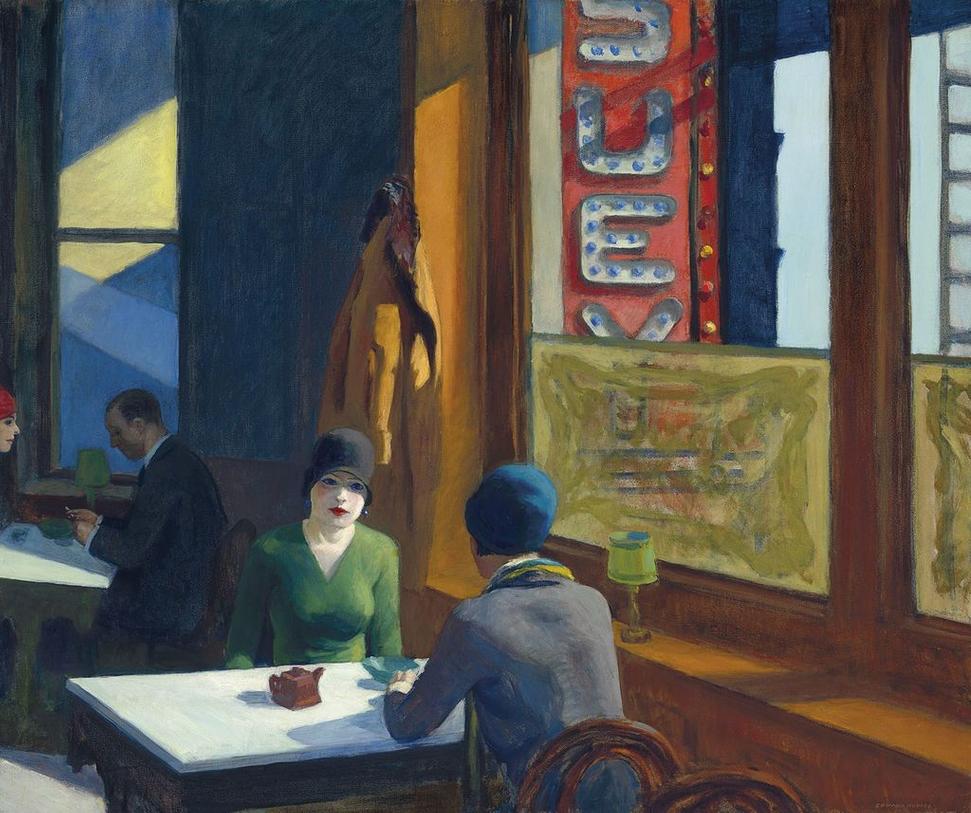
A seminal composition within the landscape of American Modernism, Edward Hopper’s Chop Sueywas one of Mr. Ebsworth’s most prized possessions (estimate in the region of $70 million). Possibly derived from a Cantonese phrase, tsap sui, meaning ‘odds and ends,’ chop suey referred not only to a low-cost stir-fry dish but, moreover, to a public destination where the societal fusion of different cultural elements of the modern city came together.

As in his masterwork Nighthawks (1942, Art Institute of Chicago, Chicago, Illinois), Hopper’s 1929 painting Chop Suey distills the atmosphere of this everyday eatery into a cinematic scene that at once depicts an implicit narrative while creating clear allusions to broader themes of social isolation, gender roles and art historical tradition. While having its roots in the French Impressionist and Ashcan traditions of painting city life, Chop Suey incorporates a thoroughly modern play of light and color to capture a specific restaurant that the Hoppers frequented on the Upper West Side of New York. The most important painting by Hopper left in private hands, Chop Suey epitomizes the psychologically complex meditations for which the artist is best known, while uniquely capturing the zeitgeist of New York during one of its most interesting eras of transition. Chop Suey was included in the groundbreaking retrospective at the Grand Palais in Paris 2012-13, which broke attendance records for the location.

Willem de Kooning’s Woman as Landscape is a tour-de-force of 20th century painting (estimate in the region of $60 million). Executed at the height of the artist’s career in 1955, this large-scale canvas belongs to a small group of works that are well positioned among the most powerful paintings in American art. Measuring over five and a half feet tall, Woman as Landscape is a heroic painting that encompasses the painterly bravado and radical use of color that singled out de Kooning as a leader of the Abstract Expressionist movement, and one of the pre-eminent painters of his generation. The shocking female forms sensationalized the art world, energizing and scandalizing in equal measure, but his vivid brushwork came to represent the dramatic shift in art that occurred in the postwar years, a change that would alter the course of art history. Now firmly established as part of the 20th century art historical canon, many of de Kooning’s Woman paintings form the cornerstones of major international museum collections and as such, Woman as Landscape is one of the only paintings from this important period of the artist’s career to remain in private hands.
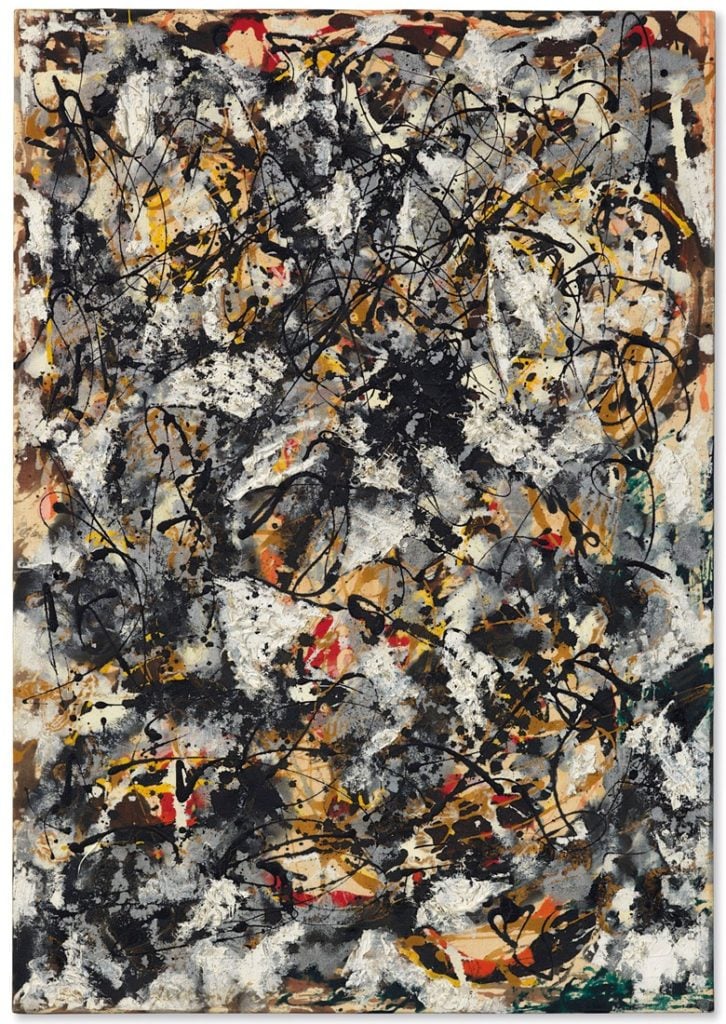
Jackson Pollock’s Composition with Red Strokes was executed in 1950 during the peak of his extraordinary creative output and is a central work to the artist’s oeuvre, demonstrating his new technique (estimate in the region of $50 million). It was these startling, original and accomplished paintings that, in Willem de Kooning's phrase, finally 'broke the ice' for American painting, completely revolutionizing it and in the process reshaping the entire history of 20th century art. The diverse, virtuosic and carefully controlled markmaking in Composition with Red Strokes represents the variety, subtlety and mystery that Pollock had achieved in his new language of paint. Displaying a fascinatingly dense, intricate and animated abstract surface, Composition with Red Strokes is one of the richest, most engaging and successfully resolved of all these famous works. Other works made by Pollock in this key period are held at the Museum of Modern Art, the Metropolitan Museum of Art, and the National Gallery of Art.

Among the other Post-War highlights in the Collection are Joan Mitchell’s 12 Hawks at 3 O’clock, created at a pivotal time when the artist’s abstraction reached new levels (estimate: $14-16 million),
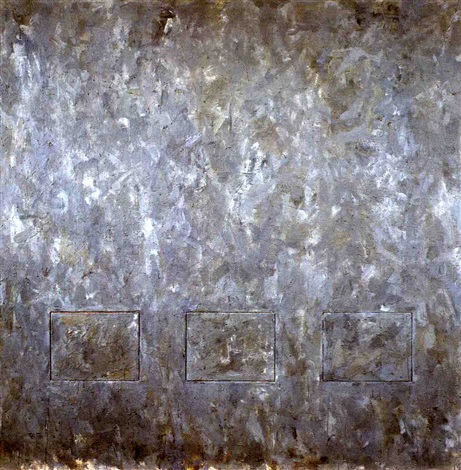
Gray Rectangles by Jasper Johns, the first work by the artist to be acquired by the legendary collectors Victor and Sally Ganz (estimate: $20-30 million), and

Franz Kline’s Painting (estimate: $5-7 million).
Ebsworth had a lasting friendship with Georgia O’Keeffe – she acted as a witness to his second marriage which took place at her Abiquiú home in New Mexico – who is represented in the Collection with

Horn and Feather, 1937 (estimate: $700,000-1,000,000)

Additional works in the Collection by members of the Stieglitz Circle are
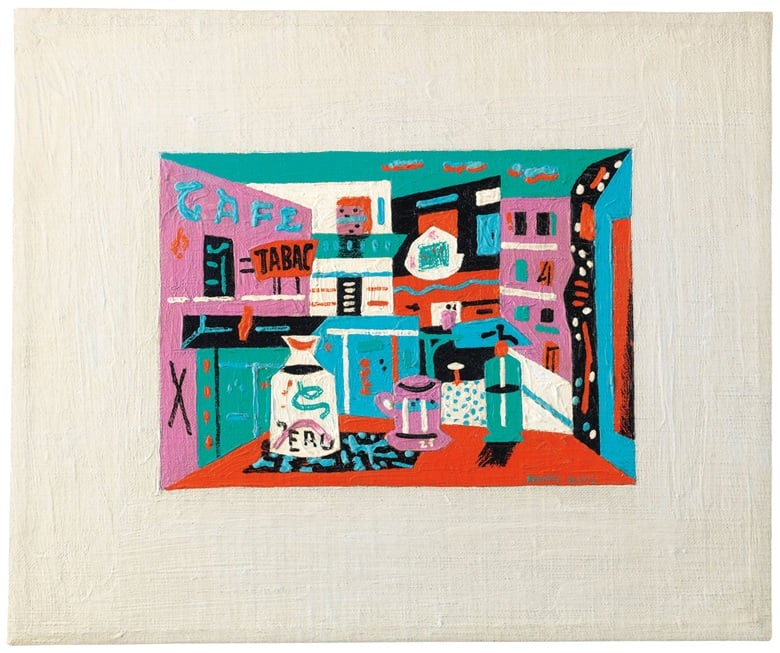
Stuart Davis’s Still Life in the Street (estimate: $500,000-700,000)
and Marsden Hartley’s Calm After Storm off Hurricane Island (estimate: $1,500,000-2,500,000).

Among the finest examples ever to appear on the market from Precisionist artist Charles Sheeler is Catwalk, 1947, which once belonged to Nelson Rockefeller (estimate: $1,200,000-1,800,000).
Representing the Ashcan School is
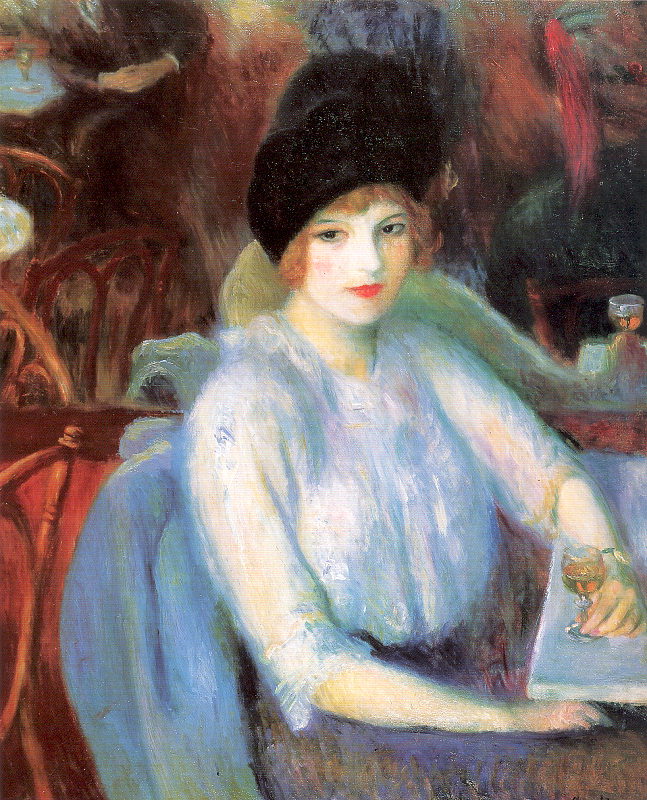
William Glackens’ Café Lafayette (Portrait of Kay Laurel), which was Ebsworth’s first acquisition of American Art in 1972 (estimate: $250,000-350,000). Among several examples by the American artists in Gertrude Stein’s circle offered in the sale are Elie Nadelman’sDancing Figure (estimate: $600,000-800,000).
The Collection also includes extremely rare examples from important artists who infrequently appear on the market and are primarily held in museums, such as Patrick Henry Bruce’s Peinture/Nature Morte (estimate: $2,000,000-3,000,000 million), which was displayed alongside Hopper’s Chop Suey in the library. In total, the Collection includes a full range of price levels, with estimates starting at $100,000.
Born in St. Louis, Missouri in 1934, Barney A. Ebsworth was an entrepreneur and his success was self-made. He founded Clipper Cruise Line, among other cruise lines, the Intrav luxury travel business and was an angel investor in the stuffed-animal phenomenon Build-A-Bear Workshop. Ebsworth’s passion for art originated during his station with the US Army in France in 1956, when he made weekly trips to the Louvre.
Mr. Ebsworth was a renowned collector who gave generously over the years to the Seattle Art Museum as well as to many other museums and charitable institutions, including gifts of major early American works. He also devoted substantial time and financial resources in support of these institutions, including serving on the Board of the Seattle Art Museum. Ebsworth was named as one of the ‘World’s 200 Greatest Collectors’ and ‘America’s Top 100 Collectors’, and served as a board member or trustee for the Seattle Art Museum, the Honolulu Museum of Art, the St. Louis Art Museum, the National Gallery of Art, Washington, the Smithsonian American Art Museum, The Frank Lloyd Wright House in Ebsworth Park, St. Louis, and the Laumeier Sculpture Park, St. Louis.
A global tour of highlights will commence in Paris 6-9 September, coinciding with La Biennale Paris, followed by highlight exhibitions in New York, Hong Kong, London, San Francisco and Los Angeles, and culminating with the auction preview at Christie’s Rockefeller Galleries in New York. The tour in Paris will include works by Hopper, Pollock, de Kooning, Kline, Nadelman, Davis, Sheeler, O’Keeffe and Glackens. The collection is expected to realize in excess of $300 million.
Marc Porter, Chairman, Christie’s Americas, commented:
“Last season, Christie’s made the bold move of launching the $835 million Collection of Peggy and David Rockefeller in Asia, underscoring our investment and deep commitment to collectors in this growing region. This season, Christie’s Paris will host the debut of this stunning collection for the global collecting community, positioning it in the heart of Europe and paying homage to Barney A. Ebsworth’s lifelong love affair with the city that first introduced him to great art. His unique journey as a collector resonates with the influence and art historical connections of Gertrude Stein’s Paris, and ultimately set a new high standard for the creation of a nuanced collection of 20thCentury Art that is without parallel in its exceptional depth and quality.”“AN AMERICAN PLACE” – COLLECTION HIGHLIGHTS
As a tribute to the former Stieglitz gallery, Ebsworth bestowed the name “An American Place” on his home in Seattle, which was built in collaboration with architect Jim Olson and designed as a dialogue between art and architecture. Ebsworth’s credo in collecting was “quality, quality, quality,” and with that mindset he amassed the most comprehensive collection of American Modernism in private hands, with many works having been loaned to leading institutions throughout his years of ownership.

A seminal composition within the landscape of American Modernism, Edward Hopper’s Chop Sueywas one of Mr. Ebsworth’s most prized possessions (estimate in the region of $70 million). Possibly derived from a Cantonese phrase, tsap sui, meaning ‘odds and ends,’ chop suey referred not only to a low-cost stir-fry dish but, moreover, to a public destination where the societal fusion of different cultural elements of the modern city came together.

As in his masterwork Nighthawks (1942, Art Institute of Chicago, Chicago, Illinois), Hopper’s 1929 painting Chop Suey distills the atmosphere of this everyday eatery into a cinematic scene that at once depicts an implicit narrative while creating clear allusions to broader themes of social isolation, gender roles and art historical tradition. While having its roots in the French Impressionist and Ashcan traditions of painting city life, Chop Suey incorporates a thoroughly modern play of light and color to capture a specific restaurant that the Hoppers frequented on the Upper West Side of New York. The most important painting by Hopper left in private hands, Chop Suey epitomizes the psychologically complex meditations for which the artist is best known, while uniquely capturing the zeitgeist of New York during one of its most interesting eras of transition. Chop Suey was included in the groundbreaking retrospective at the Grand Palais in Paris 2012-13, which broke attendance records for the location.

Willem de Kooning’s Woman as Landscape is a tour-de-force of 20th century painting (estimate in the region of $60 million). Executed at the height of the artist’s career in 1955, this large-scale canvas belongs to a small group of works that are well positioned among the most powerful paintings in American art. Measuring over five and a half feet tall, Woman as Landscape is a heroic painting that encompasses the painterly bravado and radical use of color that singled out de Kooning as a leader of the Abstract Expressionist movement, and one of the pre-eminent painters of his generation. The shocking female forms sensationalized the art world, energizing and scandalizing in equal measure, but his vivid brushwork came to represent the dramatic shift in art that occurred in the postwar years, a change that would alter the course of art history. Now firmly established as part of the 20th century art historical canon, many of de Kooning’s Woman paintings form the cornerstones of major international museum collections and as such, Woman as Landscape is one of the only paintings from this important period of the artist’s career to remain in private hands.

Jackson Pollock’s Composition with Red Strokes was executed in 1950 during the peak of his extraordinary creative output and is a central work to the artist’s oeuvre, demonstrating his new technique (estimate in the region of $50 million). It was these startling, original and accomplished paintings that, in Willem de Kooning's phrase, finally 'broke the ice' for American painting, completely revolutionizing it and in the process reshaping the entire history of 20th century art. The diverse, virtuosic and carefully controlled markmaking in Composition with Red Strokes represents the variety, subtlety and mystery that Pollock had achieved in his new language of paint. Displaying a fascinatingly dense, intricate and animated abstract surface, Composition with Red Strokes is one of the richest, most engaging and successfully resolved of all these famous works. Other works made by Pollock in this key period are held at the Museum of Modern Art, the Metropolitan Museum of Art, and the National Gallery of Art.

Among the other Post-War highlights in the Collection are Joan Mitchell’s 12 Hawks at 3 O’clock, created at a pivotal time when the artist’s abstraction reached new levels (estimate: $14-16 million),

Gray Rectangles by Jasper Johns, the first work by the artist to be acquired by the legendary collectors Victor and Sally Ganz (estimate: $20-30 million), and

Franz Kline’s Painting (estimate: $5-7 million).
Ebsworth had a lasting friendship with Georgia O’Keeffe – she acted as a witness to his second marriage which took place at her Abiquiú home in New Mexico – who is represented in the Collection with

Horn and Feather, 1937 (estimate: $700,000-1,000,000)

and Beauford Delaney, 1943 (estimate: $200,000-300,000).
Beauford Delaney, 1901–1979 by Georgia O'Keeffe (1887–1986) Pastel on paper, 1943, National Portrait Gallery, Smithsonian Institution; gift of the Georgia O'Keeffe Foundation
Additional works in the Collection by members of the Stieglitz Circle are

Stuart Davis’s Still Life in the Street (estimate: $500,000-700,000)
and Marsden Hartley’s Calm After Storm off Hurricane Island (estimate: $1,500,000-2,500,000).

Among the finest examples ever to appear on the market from Precisionist artist Charles Sheeler is Catwalk, 1947, which once belonged to Nelson Rockefeller (estimate: $1,200,000-1,800,000).
Representing the Ashcan School is

William Glackens’ Café Lafayette (Portrait of Kay Laurel), which was Ebsworth’s first acquisition of American Art in 1972 (estimate: $250,000-350,000). Among several examples by the American artists in Gertrude Stein’s circle offered in the sale are Elie Nadelman’sDancing Figure (estimate: $600,000-800,000).
The Collection also includes extremely rare examples from important artists who infrequently appear on the market and are primarily held in museums, such as Patrick Henry Bruce’s Peinture/Nature Morte (estimate: $2,000,000-3,000,000 million), which was displayed alongside Hopper’s Chop Suey in the library. In total, the Collection includes a full range of price levels, with estimates starting at $100,000.
Born in St. Louis, Missouri in 1934, Barney A. Ebsworth was an entrepreneur and his success was self-made. He founded Clipper Cruise Line, among other cruise lines, the Intrav luxury travel business and was an angel investor in the stuffed-animal phenomenon Build-A-Bear Workshop. Ebsworth’s passion for art originated during his station with the US Army in France in 1956, when he made weekly trips to the Louvre.
Mr. Ebsworth was a renowned collector who gave generously over the years to the Seattle Art Museum as well as to many other museums and charitable institutions, including gifts of major early American works. He also devoted substantial time and financial resources in support of these institutions, including serving on the Board of the Seattle Art Museum. Ebsworth was named as one of the ‘World’s 200 Greatest Collectors’ and ‘America’s Top 100 Collectors’, and served as a board member or trustee for the Seattle Art Museum, the Honolulu Museum of Art, the St. Louis Art Museum, the National Gallery of Art, Washington, the Smithsonian American Art Museum, The Frank Lloyd Wright House in Ebsworth Park, St. Louis, and the Laumeier Sculpture Park, St. Louis.